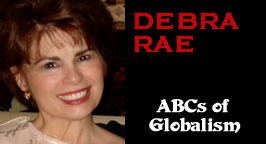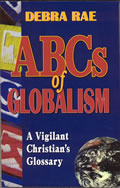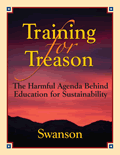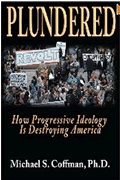EMERGING
UNIVERSALISM
PART 2
By
Debra Rae
June 14, 2014
NewsWithViews.com
Part 2: Ecumenical Reconciliation
In cadence with the likes of Dorothy, the Cowardly Lion, Scarecrow, and Tin Man, scores of unwitting folks skip merrily down the yellow brick road in pursuit of “the rainbow over the stream and the fellow who follows a dream.” Popularized in the late 18th century, and all the rage today, the dream of Universalism requires no redemption from sin, or atonement for it. Hell and damnation are unthinkable. How could a loving god possibly conceive of perdition, or condemn anyone to it? Dismissing cries for justice, Christian Universalists insist that, because all are children of God, all will be reconciled to Him and eventually be conformed to divine perfection.[1]
American author and pastor Rob Bell assuages worry, for even after death, he postulates, everyone will be cleansed. To that end, Universalists teach unconditional election, irresistible grace, and perseverance. “Christian” Universalism renders “free will” meaningless and Jesus, unnecessary. Simply live and let live. In the words of Millard Fuller (founder of Habitat for Humanity), “The New Order of the Spirit is confronting and challenging us”—not to repent and convert, but rather to “follow your bliss.” Nice work if you can get it, yes?
• Rooted in Gnosticism
Firmly rooted in Gnosticism, Universalists pooh-pooh the compulsory plan of biblical salvation. Theirs is a higher knowledge, blending speculation and imaginings from a medley of diverse sources (Greek, Roman, Jewish; theosophies and mysteries of the East). Neo-Gnostics bypass objectivism (truth/reality) for transcendent experiences.[2] The apostle Paul warned Pastor Timothy of “the gnosis [knowledge], which is falsely so called.”[3] Notwithstanding, in the 2nd century, Gnosticism spread like California wildfire. Holding a variety of opinions, both religious and philosophical, it derived certain of its features from the Kabbalah, a mystical, magical interpretation of the Bible. Kabbalism was at first an oral occult tradition from which Gnosticism emerged.[4]
• Multi-dimensional Collective Wisdom
The burgeoning “new consciousness” springs from growing awareness among Westerners of the inherent wisdom emanating from the East. Evolving “truth” is tailor-made for a religiously pluralistic, international community. Cosmic humanist Lucile Green concedes that Buddhism, Hinduism, Taoism, and Shintoism may well differ, but together they portray our world as “multidimensional.” Learning through them, she continues, “builds the foundations of a new world order” distinguished by one-world economics, global governance, and religious pluralism.[5]
The catchy motto of the United Religions Initiative[6] is “unity in diversity”; but the Bible commands believers to withdraw from—not join—those who march out of rank.[7] With no rightful promise of salvation, so-called collective wisdom ostensibly ensures equal rights and religious inclusion for all. Never mind that light has no fellowship with darkness.[8] With magnetic appeal, utopian coexistence entices nominal Christians, most non-monotheistic world religionists, and left-leaning political moralists. Exchanging the cinched waistband of sound doctrine for an adjustable drawstring of comfy compromise, Christian Universalists make room for what promises to be a veritable smorgasbord of tasty religious delicacies.
• Kingdom of Cults
A Persian transplant devoted to ecumenical syncretism, the Bahai cult ignores flagrant contradictions between and among major faith systems. Quasi-Islamist adherents of Bahai know nothing of eternal flames where sinners are forever confined. While undercutting Christian orthodoxy, these cultists clothe themselves in Western terminology—this, for broader appeal—and self-identify as superior. Their mission, after all, is to unify all faiths into a common world brotherhood.[9]
For most pluralists, however, none of the many paths to liberation or illumination reign supreme. With or without Jesus, theirs is a collective salvation. Even President Barack Obama wrongly insists, “I am saved only if we all are saved.” Sadly, deconstructing biblical orthodoxy only to replace it with “one’s own truth” opens the floodgates to deception. Case in point: Speaking at an annual leadership conference at Willow Creek Community Church, Tony Blair opined, “God’s spirit moves through us and the world at a pace that can never be constricted by any one religious paradigm. Be very wary of people who think theirs is the only way.”[10] (Jesus, for instance?)[11]
• Chrislam, Buddlam, Hindlam
Not long ago, the Memorial Drive Presbyterian Church in Houston teamed with Christian communities in Atlanta, Seattle, and Detroit to advance their own brand of “ecumenical reconciliation” between Christianity and Islam. Predictably called Chrislam, this strain of inclusive ecumenicalism qualifies mutually in harmonious texts—namely,the Bible and the Qur’an. Since a seeker eventually will discover “the superior path,” Universalists minimize irreconcilable differences or trivialize mutually exclusive dogma. Accordingly, when common ground is reached between Islamists and Buddhists, the result is called Buddlam. Syncretizing Islamic doctrine with Hindu beliefs produces Hindlam.[12]
Although the Bible establishes that God is love, the Qur’an omits any such reference. In a manner of speaking, Chrislam jams Christianity and Islam into a top hat and, with wave of a magic wand, pulls out “love” by its proverbial ears. Because the “love” concept in Islam differs significantly from that of Christian love, this love-rabbit, so to speak, is barely recognizable. In biblical Christianity, perfect love casts out fear; the two (love and fear) are mutually exclusive—you know, like oil and water. That said, Moroccan scholar Fatema Mernissi explains the centrality of fear within Islam. Many modern Muslims fear Allah and his Imams, the foreign West, democracy, freedom of thought, and individualism.[13] Turning a blind eye, Christian Universalists presume to link arms with Muslim “brothers” while mindlessly swaying to the melody and lyrics of “Give Peace a Chance.”
The question remains: How can two walk together except they are agreed?[14] Truth be told, they can’t. All three doctrinal mutations dilute the essence of their respective religions; sadly, all portray God as indecisive.[15] To the contrary, the God of the Bible exhibits “no shadow of turning.”[16] The Greek word for “turning” likely references “revolution of the heavenly orbs.”[17] The Septuagint[18] applies the same term to fluctuations in the heavens.[19] By turning upon its axis, the earth changes its relationship to the sun and thereby alters shadows. Not so with the immutable God of the Bible.[20] He alone is without variableness or shadow of turning.[21]
• Common Ground Project
A world-renowned humanitarian, the late Mother Teresa embodied Universalism. Acknowledging different ways of following God, she helped a Hindu to become a better Hindu, a Muslim to become a better Muslim, a Catholic become a better Catholic. According to her theological grid, the god in one’s mind is the god one must accept; and Jesus inhabits us all.[22] If you follow Buddhist practices, you ostensibly get to Buddhist heaven. In like fashion, if you follow Muslim practices, you’re guaranteed Muslim paradise,[23] especially if you strap on a bomb for detonation in some public forum.
Today, the key proponent for pluralism is His Holiness, the Fourteenth Dalai Lama. Thought to be a deity, this affable Tibetan monk hinges human survival on interfaith cooperation.[24] In May of 2010,he joined a panel of select scholars who together launched the Common Ground Project.[25] Planned over several years by HRH Prince Ghazi bin Muhammad of Jordan, along with the Dalai Lama, the project nurtures spiritual relationships across diverse faith traditions.
|
Universalist efforts, as these, trump biblical truth with commitment to “tolerance,” which at best is highly selective. Almost anything goes, but to reject the “many paths” dogma is not tolerated. While on a lecture tour, Israeli journalist and Jewish theologian Avi Lipkin was sentenced in accordance with Swiss anti-racism law. Why? He characterized minarets as “nails in the coffin of the West.” Rather than submit to re-education in some mosque (called “community service”), Avi opted for a jail sentence.[26] Even for Universalists, tolerance apparently has its limits.
Despite bogus claims to the contrary, the broad road of collective consciousness in no way ensures religious “harmony” and “solidarity.”[27] Neither time, nor ideologies, nor clever tactics can redefine or distil truth. It’s not subject to my belief, or yours. Instead, truth is the very essence of God,[28] who changes not.[29] Better to buy the Truth and sell it not[30] than to cast it aside for some Utopian dream that never will be realized.[31]
Click here for part -----> 1, 2, 3,
� 2014 Debra Rae - All Rights Reserved
Footnotes:
1.
Biblical salvation involves recognition that I am a sinner (Romans 3:23)
and therefore under condemnation of death (Hebrews 9:27; Romans 6:23).
God requires, a moral change of attitude (repentance, Acts 17:30; Luke
13:5), belief and receipt of Jesus Christ as personal Savior/Lord (Hebrews
9:22; 1 Timothy 2:5; Acts 4:12) for me to embrace, by grace through
faith, the freely given gift of salvation (2 Corinthians 5:21). Public
Confession of Jesus Christ and water baptism follow (Romans 10:9; Acts
1:8 and 2:38 39); and a changed life, empowered by the Holy Spirit,
demonstrates my newfound relationship with the Lord (Acts 19:5-6; John
3:3; 2 Corinthians 5:17). In the end, God will judge every man’s
deeds, without respect of persons. (Romans 2:6,11) The wages of sin
is death. (Romans 6:23) What this looks like, as detailed throughout
the Bible, bears no resemblance to Universalism’s Doctrine of
Inclusion: Matt. 8:12, 11: 21 and 24, 25:41 and 46; Mark 12:40; Luke
12:47-48, 16: 22-31; 1 Peter 3:19; 2 Peter 2:9, Jude 7 and 13, Revelation
6:9-11, 14:9-11 and 20:10.
2.
GNOSTICISM.
Accessed 28 May 2014
3.
1 Timothy 6:20.
4.
Debra Rae. The ABCs of Globalism: A Vigilant Christian’s Glossary
(Lafayette: Huntington House Publishers, 1999). 171-173.
5.
Globalism is an interdependent, one-world state that rejects traditional
faith systems in search of enlightened collaborative consciousness.
Global citizens pledge allegiance to no nation-state, but rather to
the world community. Harmonization speaks to elimination of national
sovereignty; globalization redistributes the world’s wealth, concentrating
that wealth, therefore power, into the hands of the illumined few.
6.
United Religions Initiative (URI)is a global, grassroots, interfaith
network that cultivates peace and justice by engaging people to bridge
religious and cultural differences and work together for the good of
their communities and the world. http://www.uri.org/.
Accessed 29 May 2014
7.
1 Thessalonians 3:6,14
8.
2 Corinthians 6:14.
9.
Walter R. Martin. “The Bahai Faith.” The Kingdom of the
Cults (Minneapolis: Bethany Fellowship, Inc., Publishers, 1977). 252-258.
10.
http://www.blogtalkradio.com/sharonhughes.
Accessed 29 May 2014.
11.
John 14:6.
12.
http://www.ltdmin.com/term.php?id=317.
Accessed 29 May 2014
13.
Fatemah Mernissi. Islam and Democracy: Fear of the Modern World. (New
York: Perseus Book Group, 1992).
14.
Amos 3:3.
15.
Christlam
Spreads throughout America. Accessed 27 May 2014.
16.
James 1:17
17.
Expository Dictionary of New Testament Words, IV, page 163.
18.
Greek version of the Old Testament.
19.
Job 38:33.
20.
Malachi 3:6; Hebrews
13:8.
21.
Wayne Jackson. “The
Shadow Cast by Turning” (Christian Courier
22.
Mother
Teresa, Accessed 27 May 29, 2014 and Sharon
Hughes, Accessed 27 May 29, 2014
23.
Acts 4:12
24.
Carl Teichrib. “Occultism in the Heartland: Speaking the Message
of Interfaithism” (Indianapolis: Hope for the World UPDATE, Fall
1999). 1-4.
25,
Dr Reza Shah-Kazemi. Common Ground Between Islam and Buddhism
(London: The Matheson Trust for the Study of Comparative Religion, 2010).
26,
http://www.israpundit.com/archives/33066.
Accessed 29 May 2014.
27,
Jesus warned that “if it were possible” the Master of Deception
would deceive even the very elect of God (Matthew 24:24). For this reason,
believers are warned to be watchful (2 Corinthians 10:12; 1 Peter 5:8).
28,
John 14:6.
29,
Malachi 3:6.
30,
Proverbs 23:23.
31,
Matthew 7:6.













 Share
This Article
Share
This Article






